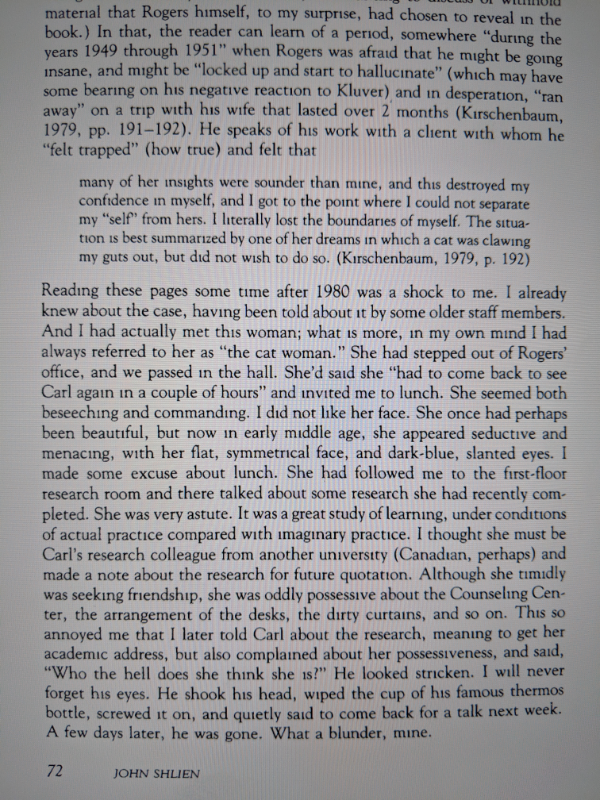“Empathy in Psychotherapy: A Vital Mechanism? Yes. Therapist’s Conceit? All too Often. By Itself? No.” John Shlien
Fascinating! I wish more folks who call themselves sociologists were empathic+caring! The Anatomy of Empathy – VICE https://t.co/U4XMc3Zac7
— Carla Shedd (@CarlaShedd) May 7, 2019
Because people love me, they often send me things happening out in the world where people are grappling with this thing we call “empathy” (please continue to do so watching this unfold is helping me think through things).
Yesterday I was sent the tweet above about a Vice article “The Anatomy of Empathy” which I’d missed where a doctor and a masseuse have what they are calling “mirror-touch synesthesia”. My initial thought: if you are calling it something other than “empathy” why is it being called empathy? My second thought: lolsob.
Here is a very short story. Once upon a time an amazing mentor asked me what I meant when I said “empathy”. This led me down a reading hole. I read moral philosophy, psychology, neurology, cultural theory, religious studies, decolonial theory, phenomenology, aesthetics, history, etc etc I mean, it was a lot. I read a lot. As far as I could find empathy is made up. The timeline in the article is wrong. It appeared long before 1967. There are a few other things that are inaccurate so I am taking the background portions with a grain of salt. The thing I am thinking about after reading it though is…
Empathy is predictive analytics for feelings.
The ability to predict and imagine the current and future state of a person is dependent on the amount of data (towards humanization), the empathizer has.
I am glad that a doctor and a masseuse are able to feel the body of others more. And it makes sense they would learn to super feel for the other they are caring for. All disciplines seem to agree that whatever empathy may be it is extremely biased and not as altruistic as we imagine it to be, like most technologies (if we choose to see feelings as a technology for navigating/experiencing the world). Given that both of their jobs and their ability to do their job well is dependent on having a deeper understanding of the body, being able to create an image of an empty body in their mind that they feel through seems like an amazing tool for them to be able to predict (by imagining the body of the other as their own) what the best course of treatment will be.
But why imagination? There is a book, Empathy: A History by Susan Lanzoni that goes into the history of empathy from Germany, imported to the US in the early 1900s, where it percolated having first two meanings and then one as a psychology of the imagination. The story of empathy I find most fascinating has to do with Carl Rogers, a humanist psychologist, heavily discussed in the article the image comes from. He apparently decided to focus on “empathy” because he had a woman patient who was smart (maybe even smarter than him), and it led to a breakdown of sorts apparently (see page below).

Anyway, the article is wild. Psychedelics make an appearance too. All that to say, in clinical settings it seems that empathy is always used to predict feelings of the other in some form through mirroring in the mind. The limits of our dataset will limit who we are able or mirror either in emotions or physical feeling. I am always struck by the negative outcomes in healthcare for black women when I think of this because there are two parts to being treated, the provider needs to both be able to mirror your body in their brain to some degree and/or feel that you are worth feeling for in such a way that will lead to treatment.
Black women often have to establish a relationship with a physician over time before they can be taken seriously as a person, they do not get treatment until they are able to convince the person to take them seriously. There is no predictive apparatus built into western culture that would allow people to feel for and into black women in that way. From personal experience, I can say I was sick for a very long time (more than a decade). When I moved back to the NYC metro area I was able to change all my doctors to women of color. That was the point where I was finally taken seriously and finally had a team of doctors who wanted to figure out what was actually going on, and they did. Was it empathy? Maybe? if you think understanding and feeling for another human as though they are worthy of feeling for and doing so and understanding the implications down the road is empathy. sure.
Leave a Reply